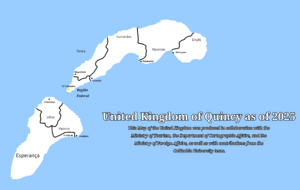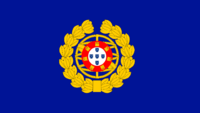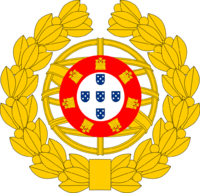Quincy: Difference between revisions
m (Added wikilink to 5 October 1910 revolution) |
m (Removed anthem; Quincy has no anthem) |
||
| Line 18: | Line 18: | ||
| national_motto = Deus, Pátria, Rei, Fidelidade | | national_motto = Deus, Pátria, Rei, Fidelidade | ||
| english_motto = God, Homeland, King, Fidelity | | english_motto = God, Homeland, King, Fidelity | ||
| image_map = [[File:MapofQuincy2036.png|300px]] <!--e.g. LocationCountry.svg--> | | image_map = [[File:MapofQuincy2036.png|300px]] <!--e.g. LocationCountry.svg--> | ||
| loctext = <!--text description of location of country--> | | loctext = <!--text description of location of country--> | ||
Revision as of 17:08, 22 November 2024
This article is incomplete because it is pending further input from participants, or it is a work-in-progress by one author. Please comment on this article's talk page to share your input, comments and questions. Note: To contribute to this article, you may need to seek help from the author(s) of this page. |
From IIWiki, the Modern and Future-Tech SimFic Encyclopedia.
"Quincy," "United Kingdom of Quincy," "Quincia," and "UKQ" all redirect here. For further uses, see Quincy (disambiguation)
| Message from The Royal Government: This article is undergoing heavy revisions and construction, please be patient as I add details to the page. It may take me some time to compile everything. |
The United Kingdom of Quincy Reino Unido de Quincia (Portuguese) | |
|---|---|
| Motto: Deus, Pátria, Rei, Fidelidade | |
 Map of the United States of Quincy as of 2036 | |
| Status | Sovereign State |
| Capital and largest city | FC Côlombia |
| Official languages | Portuguese |
| Recognised national languages | English |
| Ethnic groups (2020) | Quincois, Mexican, American |
| Religion (2020) | 65% Episcopalianism, 34% Atheism, 1% Other |
| Demonym(s) | Quincois |
| Government | Federal parliamentary constitutional monarchy |
• King | Duarte Carlos II |
• Prime Minister | Anacleto Húso |
| Legislature | Parliament |
| House of Commons | |
| Independence from the Kingdom of Portugal | |
• Formation | 1521 |
• Independence | May 7, 1820 |
• Current Code of Laws | 1945 |
| Area | |
• Total | 37,036 km2 (14,300 sq mi) (83rd) |
• Water (%) | 10% |
| Population | |
• 2020 estimate | 1.7 million (148th) |
• Density | 45.9/km2 (118.9/sq mi) |
| GDP (PPP) | 2020 estimate |
• Total | 2.8R trillion |
• Per capita | 87,666R |
| GDP (nominal) | 2020 estimate |
• Total | 2.7R trillion |
• Per capita | 87,620R |
| Gini (2020) | 24.1 low |
| HDI (2020) | 0.911 very high (WIP) |
| Currency | Quincois Real |
| Time zone | UTC-6:00 (UTC -06:00/Central Standard Time) |
| Date format | dd/mm/yyyy |
| Driving side | right (side of road) |
| Calling code | +01 |
| Internet TLD | .qu |
Quincy (/ˈkwˈɪnsi/KWIN-zee), officially the United Kingdom of Quincy (Portuguese: Reino Unido de Quincia) is a nation located in the Gulf of Mexico. It is bordered on all sides by the Gulf of Mexico, though sharing a maritime border with both Mexico and the United States. Quincy comprises 8 states and one capital region, known as the Federal Region, or Região Federal, and has a population of 1.7 million. Quincy is also a part of the Organization of American States and the United Nations.
Etymology
UNDERGOING EXTREME REVISIONS TO FIT NEW LORE
History
Early History
Prior to colonization in 1521, Quincy was entirely uninhabited. While some groups had established temporary settlement, no larger entity had properly settled down on the Ilhasul or Ilhanorte. In 1521, Portuguese explorers, unknowingly breaking the Treaty of Tordesillas, would set up a colony around the modern city of CF Colômbia, at the time calling it Colômbia for the namesake of Christopher Columbus. By 1530, the name "Quincia" was being applied to the entire colony, granting it the name it has today. Early colonization efforts most primarily focused around the Ilhanorte, with Portuguese efforts to expand in the Ilhasul being much more limited. The Ilhasul only saw one settlement founded, Araújo, which at the time was little more than a tiny outpost on the fringes of the massive jungles of the Ilhasul. However, after years of slow expansion, the colony began to show signs of success, with the local economy being bolstered and slowly growing as time went on. By the mid-1600s, Quincy was considered an equal partner to Portugal and Brazil, which led to the formation of the United Kingdoms of Portugal, the Algarves, Brazil, and Quincia in 1640, which would last from 1640 to 1810, at which point Brazil broke off.
Lead-Up To And After Independence up to 1910
In 1810, after Brazil withdrew from the UKPABQ, it was left as the United Kingdoms of Portugal, the Algarves, and Quincia (UKPAQ), but this union would be short lived. Spurred somewhat by the declaration of independence in the United States a few decades prior, Quincy declared its independence in 1820 under Portuguese supervision on May 7. Interestingly, the country opted to keep the monarchy intact, and it remained as the head of state of the new United Kingdom of Quincy.
After gaining independence, Quincy was left as a small, mostly unpopulated nation. As such, the House of Bragança did not largely pay attention to the small kingdom. Nonetheless, the United Kingdom of Quincy kept moving forward, continuing to establish itself. Under the Liberal Party leadership of Prime Minister Morellus Sãoci (1820-1828), Quincy began to slowly build up a domestic industry around mining and manufacturing, both of which bolstered the Ilhanorte in particular, with significant efforts being made to try and extend the effects to the Ilhasul, but it would take some time for this to occur. Under successive Liberal Party Prime Ministers Roberto Norte (1828-1836) and Duvalier Gautierri (1836-1844), Quincy's economy began to grow further, until finally around 1840 it began to show fruit with the first railways between CF Colômbia and Magalhães, bolstering the local regions in particular, especially around the Magalhães-Gusmão-Colômbia tri-state area.
By the turn of the century in 1900, Quincy had experienced four parties coming and going in power, each leaving massive influences on the country at large, with some of the largest impacts being the first revision to the Code of Laws in 1880, followed by a second version in 1900. Under the leadership of Orgullo Brusul (1892-1900), Quincy had entered a period of relative stability, turning into one of the most stable countries in the world. This would, however, change in 1910, when the Lusitanian House of Bragança was forced to flee to Quincy, which led to the rise of Antonio Mãoço.
Antonio Mãoço and the Emergency Provisional Government (GPE)
Antonio Mãoço had been a relatively well-recognized figure in Quincy from 1900 onwards. In 1910, following the Republican Revolution in Portugal, the House of Bragança was forced to flee to the last nation with a Portuguese monarch as its head: Quincy. The monarchy thus settled down in CF Côlombia, making it their permanent residence.
During this time, Quincy had held its 1910 election, with an overwhelming 87% majority voting for Antonio Mãoço, but this unknowingly would destroy Quincois democracy for decades.
Geography
WIP
Demographics
Population
UNDERGOING EXTREME REVISIONS TO FIT NEW LORE
Language
UNDERGOING EXTREME REVISIONS TO FIT NEW LORE
Religion
UNDERGOING EXTREME REVISIONS TO FIT NEW LORE
Race
UNDERGOING EXTREME REVISIONS TO FIT NEW LORE
Largest Cities (WIP)
| Rank | State | Pop. | |||||||
|---|---|---|---|---|---|---|---|---|---|
| 1 | wip | wip | wip | ||||||
| 2 | [[{{{city_2}}}]] | [[{{{div_2}}}]] | {{{pop_2}}} | ||||||
| 3 | [[{{{city_3}}}]] | [[{{{div_3}}}]] | {{{pop_3}}} | ||||||
| 4 | [[{{{city_4}}}]] | [[{{{div_4}}}]] | {{{pop_4}}} | ||||||
| 5 | [[{{{city_5}}}]] | [[{{{div_5}}}]] | {{{pop_5}}} | ||||||
| 6 | [[{{{city_6}}}]] | [[{{{div_6}}}]] | {{{pop_6}}} | ||||||
| 7 | [[{{{city_7}}}]] | [[{{{div_7}}}]] | {{{pop_7}}} | ||||||
| 8 | [[{{{city_8}}}]] | [[{{{div_8}}}]] | {{{pop_8}}} | ||||||
| 9 | [[{{{city_9}}}]] | [[{{{div_9}}}]] | {{{pop_9}}} | ||||||
| 10 | [[{{{city_10}}}]] | [[{{{div_10}}}]] | {{{pop_10}}} | ||||||
Government
WIP
Military
UNDERGOING EXTREME REVISIONS TO FIT NEW LORE
Culture
UNDERGOING EXTREME REVISIONS TO FIT NEW LORE
Sports
Cuisine
Economy
Infrastructure
UNDERGOING EXTREME REVISIONS TO FIT NEW LORE
Energy
UNDERGOING EXTREME REVISIONS TO FIT NEW LORE


